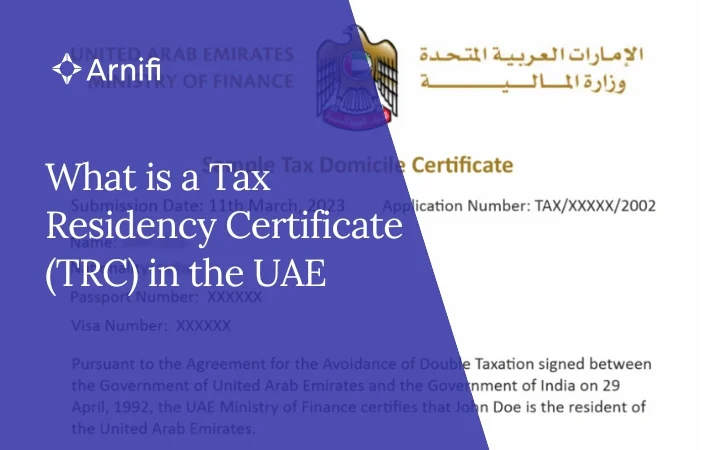Updated Guide: Corporate Tax FAQs in UAE 2024
by Shethana Sep 17, 2024  7 MIN READ
7 MIN READ

The UAE is starting a new corporate tax (CT) law in 2024. This is important for businesses in the UAE. The Federal Tax Authority will manage and enforce this new law. Companies need to know how it affects their work.
Starting from 1 June 2023, businesses must follow the new tax rules. This change in the CT law means that businesses in the UAE must adjust to the new regulatory requirements.
Key Features of UAE’s Corporate Tax Policy
The UAE has a corporate tax policy. It has a tax rate of 9% on taxable income over AED 375,000. Taxable income is based on a business’s net income. It is adjusted for certain items that are part of the CT law. Some entities do not have to pay corporate tax. This includes government entities and some public benefit organizations.
In addition, the UAE offers tax incentives for businesses in special free zones. These incentives can lower a business’s tax burden. This makes free zones a great choice for companies wanting to start or grow in the UAE.
Determining Tax Liability
To figure out how much tax a business owes under the UAE’s corporate tax rules, you need to know its tax status. It is important to find out if the business is a ‘taxable person,’ or if it is an exempt entity or a qualifying Free Zone Person (QFZP).
Criteria for Taxable Entities in the UAE
The UAE corporate tax rules identify a ‘taxable person’ as a business that operates in the UAE, whether they are from here or abroad. Resident ‘taxable persons’ include companies set up in the UAE, including those in free zones. It also includes foreign companies that are managed and controlled in the UAE. Additionally, people who run business activities in the UAE may be seen as ‘taxable persons’ based on a future Cabinet decision.
Non-resident companies can be ‘taxable persons’ if they have a permanent location in the UAE, make money from UAE sources, or have ties to the UAE, according to a Cabinet decision. Businesses should look closely at their situation and activities to figure out their tax responsibilities under the new regime. Having accurate financial statements is important to show their financial status.
Identifying Exempt Income and Entities
The UAE corporate tax rules allow some income sources and certain businesses to be free from corporate tax. Anna income from qualifying shareholdings, such as dividends and capital gains earned by a UAE business does not get taxed. Also, income from certain intra-group transactions and reorganizations that meet specific requirements is tax-exempt.
Many entities do not have to pay corporate tax. This includes government entities, government-controlled entities (yet to be confirmed), and businesses that work in natural resource extraction. Other exempt entities are qualifying public benefit organizations, social security funds, public and private pension funds, and qualifying investment funds.
Compliance and Administration
Understanding the rules and paperwork for the new corporate tax system is important for businesses in the UAE. Key points to remember are registering with the Federal Tax Authority, keeping up with filing deadlines, and having correct financial records.
Filing Corporate Tax Returns: Procedures and Deadlines
Businesses identified as taxable entities under the UAE’s corporate tax regime must adhere to specific procedures and deadlines for filing corporate tax returns. Generally, tax returns are submitted for the financial year, aligning with a business’s fiscal year. However, businesses following the calendar year will file returns accordingly. The following table summarizes the deadlines:
| Financial Year | Filing Deadline |
| 1 July 2023 – 30 June 2024 | 31 December 2024 |
| 1 January 2024 – 31 December 2024 | 30 September 2025 |
Timely filing in accordance with regulatory requirements is essential to avoid penalties. Failure to submit tax returns by the due course can lead to significant financial penalties.
Penalties for Non-Compliance and How to Avoid Them
Not following the UAE’s corporate tax law can lead to penalties from the Ministry of Finance. These penalties may include large fines. To avoid these penalties, businesses should focus on understanding the corporate tax law in the UAE. This includes knowing the registration steps, filing tax returns on time, understanding payment schedules, and keeping accurate records.
Working with tax experts, like TMF Group, can help businesses understand the tax rules better. By actively learning and sticking to these rules, businesses can reduce risks.
Special Considerations for Free Zone Entities
Free zone entities in the UAE have special benefits under the corporate tax rules. They must pay corporate tax, but there are specific exemptions and incentives available. This makes them great places for businesses.
Tax Implications for Businesses in Free Zones
Free zone businesses in the UAE fit into a group called ‘qualifying free zone persons’ (QFZPs). They follow the overall rules of the UAE’s corporate tax system. One big advantage is that they might be able to enjoy a 0% tax rate on their qualifying income from operations. To keep this benefit, they need to do a few things. They must show that they have a real business, earn qualifying income, follow transfer pricing rules, and not choose the normal 9% corporate tax rate.
However, QFZPs need to pay the standard 9% tax rate on any taxable income that doesn’t meet the “qualifying income” rules. Also, transactions they make with businesses in mainland UAE will also get taxed at the regular rate.
Qualifying Conditions for Free Zone Tax Benefits
To take advantage of the special tax benefits for qualifying free zone persons (QFZPs), businesses need to meet several conditions. They must show they have strong business operations in the free zone. They also need to earn qualifying income, which is yet to be clearly defined by a Cabinet Decision. Additionally, businesses must follow transfer pricing rules. These rules make sure the pricing for transactions between related companies is fair.
Free zone businesses must keep meeting these conditions. This way, they can keep their tax benefits and make the most of what the free zones offer. It’s important to understand and follow these rules to fully benefit from operating in a UAE free zone.
In conclusion, it is very important for businesses to understand the new corporate tax system in the UAE. Knowing the key parts of the tax system helps companies manage the new rules well. They need to find out their tax liability and follow the rules for filing taxes on time. This way, they can reduce risks and improve their tax situation.
Companies in free zones have special tax rules, which makes it necessary to understand these differences. Staying informed and taking action can help avoid penalties and take advantage of tax incentives when available. If you need more help or have questions about corporate tax in the UAE, check out our guide or contact our experts.
Frequently Asked Questions
Who needs to file corporate tax returns in UAE?
Any entity called a ‘taxable person’ must file corporate tax returns with the Federal Tax Authority. This includes companies based in the UAE, foreign firms that have a permanent presence in the UAE, and individuals who carry out certain business activities in the UAE.
How do foreign corporations get taxed on UAE-sourced income?
Foreign companies only pay taxes on money they earn in the UAE if they have a permanent place of business in the country. They will also be taxed if their income is linked to a fixed base in the UAE. Currently, the UAE does not have a global minimum tax rate. Therefore, foreign companies without a presence in the UAE usually do not have to pay UAE corporate income tax.
Also Read: UAE Corporate Tax: The Need for Business Documentation
About Arnifi
Arnifi is digital first Corporate service provider helping companies enter the Middle East region, starting with UAE and Saudi Arabia markets. Founded and backed by professionals from Amazon, Souq and other large companies operating in KSA – the team understands what it takes to succeed as a startup in both UAE and Saudi Arabian markets, apart from going through the setup process multiple times. Arnifi will provide a truly digital experience to entry and scale up of companies both UAE and Saudi Arabia. Discover tailored solutions and strategic partnerships that propel your business forward. Check out at – www.Arnifi.com for more details.
READ MORE: Beginner’s Guide to Excise Tax in UAE
Top UAE Packages

Related Articles
Top UAE Packages



